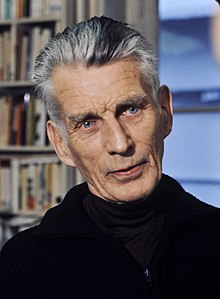Samuel Beckett | |
|---|---|
 Beckett in 1977 | |
| Born | Samuel Barclay Beckett 13 April 1906 Foxrock, Dublin, Ireland |
| Died | 22 December 1989 (aged 83) Paris, France |
| Resting place | Cimetière du Montparnasse |
| Occupation |
|
| Language |
|
| Education | |
| Notable works | |
| Notable awards |
|
| Spouse | |
| Signature | |
Samuel Barclay Beckett (/ˈbɛkɪt/ ; 13 April 1906 – 22 December 1989) was an Irish novelist, dramatist, short story writer, theatre director, poet, and literary translator. His literary and theatrical work features bleak, impersonal, and tragicomic experiences of life, often coupled with black comedy and nonsense. His work became increasingly minimalist as his career progressed, involving more aesthetic and linguistic experimentation, with techniques of stream of consciousness repetition and self-reference. He is considered one of the last modernist writers, and one of the key figures in what Martin Esslin called the Theatre of the Absurd.[1]
A resident of Paris for most of his adult life, Beckett wrote in both French and English. During the Second World War, Beckett was a member of the French Resistance group Gloria SMH (Réseau Gloria) and was awarded the Croix de Guerre in 1949.[2] He received the 1969 Nobel Prize in Literature "for his writing, which—in new forms for the novel and drama—in the destitution of modern man acquires its elevation".[3] In 1961 he shared the inaugural Prix International with Jorge Luis Borges. He was the first person to be elected Saoi of Aosdána in 1984.
- ^ Cakirtas, O. Developmental Psychology Rediscovered: Negative Identity and Ego Integrity vs. Despair in Samuel Beckett's Endgame. International Journal of Language Academy.Volume 2/2 Summer 2014 p. 194/203. http://www.ijla.net/Makaleler/1990731560_13.%20.pdf Archived 25 February 2017 at the Wayback Machine
- ^ Davies, William (2020). Samuel Beckett and the Second World War. Bloomsbury. pp. 31–50.
- ^ "The Nobel Prize in Literature 1969". Nobel Foundation. 7 October 2010. Archived from the original on 30 May 2011. Retrieved 7 October 2010.